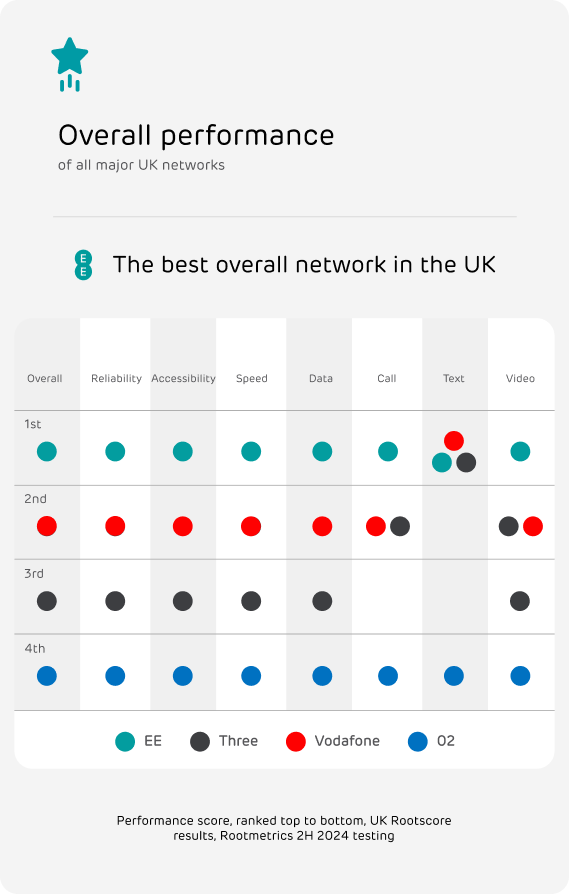Network Boost
We’re the only UK mobile company that gives you a Network Boost on premium plans. This means we’ll prioritise your signal in busy or crowded areas, giving you the best possible connection.

We’ve been named the UK’s best mobile network for the 12th year running by the impartial network data experts at RootMetrics.
We offer the fastest overall speeds, we’re more reliable than anyone else, and we give you the best 5G experience.
It all means we’re unbeatable for mobile gaming, video streaming and phone calls.
Network Boost
We’re the only UK mobile company that gives you a Network Boost on premium plans. This means we’ll prioritise your signal in busy or crowded areas, giving you the best possible connection.

In the first half of 2025, RootMetrics conducted approximately 635,000 tests around the UK (4G and 5G combined), including 16 major cities.
The results concluded that EE is:

We’ve got 5G in more places than any other network in the UK.
You’ll get a reliable, superfast connection wherever you are.
5G on EE brings you a wealth of new experiences – from being the ultimate gamer to walking down the tunnel with your team on match day.

5G+ is the latest evolution in network technology..
5G+ used to be called 5G Standalone. This is because it works independently of the 4G network, extending our 5G coverage beyond 4G areas.




5G+ will unlock new features and benefits.
5G+ will unlock game-changing services. This includes network slicing, which can give users a dedicated lane for certain apps or activities.
Perfect for mobile gaming, streaming or video conferencing on the move.
Some connections can be life or death, as with self-driving vehicles or remote medical procedures.
5G+ will enable more immersive augmented and virtual reality, automated factories, and robotics.

We’re rolling out 5G across the UK. Check 5G coverage before buying. Speeds vary by location, coverage and demand. 5G coverage, plan and compatible device needed. To verify more places, e-mail most.places@ee.co.uk. Terms apply.
THE UK’S BEST NETWORK 12 YEARS IN A ROW: Rankings based on the RootMetrics® UK RootScore® Report: From H2 2013 to H1 2025. Tested with best commercially available smartphones on 4 national mobile networks across all available network types. Your experiences may vary. The RootMetrics award is not an endorsement of EE. Visit ee.co.uk/claims for more details.
Fastest / Most Reliable based on the RootMetrics® UK RootScore® Report: H2 (July-Dec) 2024. Tested at locations across the UK with the best commercially available smartphones on 4 national mobile networks across all available network types. Your experiences may vary. The RootMetrics award is not an endorsement of EE. Visit ee.co.uk/claims for more details.